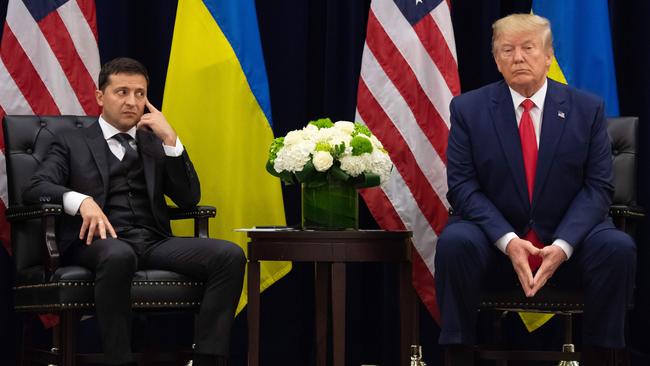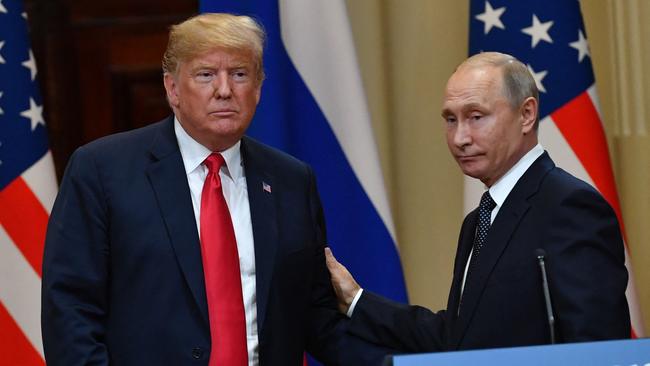How Trump can help Ukraine win

Mr Trump’s promise to end the war heralds an ambitious, activist foreign policy. His pledge to do so in 24 hours is clearly an exaggeration but signals eagerness for a diplomatic solution to what will soon be a three-year war.
The terms of a Trump-led settlement, while not set in stone, have been discussed in the media. Such a deal is reported to include an end to hostilities, with European (and perhaps other) peacekeepers policing a line of separation between the two warring parties. It also would include a commitment by both sides not to use military means to capture or reclaim territory, Western support for a strong Ukrainian defence, and a 20-year moratorium on Ukrainian membership in the North Atlantic Treaty Organisation.

Settling the war on these terms, however, will face formidable hurdles. The most important is Vladimir Putin’s opposition to any settlement that falls short of Ukraine’s capitulation. Mr Putin’s conditions for the war’s end include cession of more territory in Ukraine’s eastern regions, Ukrainian neutrality, and Ukraine’s demilitarisation. Taken together, these would mean a de facto end to Ukraine’s sovereignty.
The Trump administration must find new levers to move Mr. Putin from his intransigence. Among these are threats to increase the economic costs of sustaining the war and to increase the pain Russia and Russians bear for doing so. Mr Trump has alluded to such an approach. As a strategy paper from the Trump-aligned America First Policy Institute noted, a successful policy would require “enabling Ukraine to negotiate from a position of strength” and developing “a long-term security architecture for Ukraine’s defence.” Yet Mr. Trump’s ability to press Mr. Putin into accepting a settlement could be undermined by the eager public declarations of many in Mr. Trump’s inner circle to curtail or cease U.S. spending on Ukraine.

There is another Trumpian path that could both finance Ukraine’s war effort and reduce U.S. contributions to it. This path requires mobilising the $300 billion in Russian hard currency in Western banks, most of it at Euroclear, an international clearing and settlement service in Belgium. The Biden administration and European leaders have been reluctant to tap these assets, wrongly fearing such a course could undermine the dollar and the euro.
But today’s extraordinary conditions warrant seizure. Russia not only has invaded a sovereign country; it has annexed the internationally recognised territory of a sovereign state. Since the creation of the United Nations in 1948, there has been only one other such case: Iraq’s invading and annexing Kuwait. George H.W. Bush’s administration seized billions in Iraqi hard-currency reserves held in the U.S. and transferred them to Kuwait as compensation for the invasion.
Two veterans of several Republican administrations — former State Department counsellor Philip Zelikow and Robert Zoellick, a former head of the World Bank — have invoked the Iraq precedent. Russia’s actions in Ukraine are so odious and violative of international norms, they argue, that Moscow has for the period of the war lost the right to the protection of these norms, including the right to its state assets in Western banks. These assets can be seized and used to buy U.S.-made and internationally manufactured weapons for Ukraine’s war effort and, if the war ends, to rebuild Ukraine.

A diplomatic effort bolstered by the threat of turning these Russian assets against Russia itself could help compel the Kremlin — already grappling with an economy strained by defence spending — into settling. Coupled with a threat to permit Ukraine to use missiles to strike deep into Russian territory, including targeting Moscow and its power grid, such a policy could drive the Kremlin to accept a settlement Mr. Trump proposes.
Any settlement that leaves 20% of Ukraine’s territory in Russia’s hands will be hard for Ukrainians to accept. But most war-ravaged Ukrainians are likely to accept one that enhances their country’s sovereignty through bilateral security guarantees and deters future Russian aggression with resources that let Ukraine strengthen its military capabilities and rebuild its cities.







Donald Trump’s most consequential foreign-policy priority will be Russia’s war on Ukraine. A conclusion to the conflict that preserves Ukraine’s long-term security will end widespread death and destruction and bolster America’s image as a force for good. A policy that leads to the collapse of Ukraine will cause needless loss of life, unleash a massive refugee crisis for America’s European allies, and embolden a loose alliance of tyrannies.